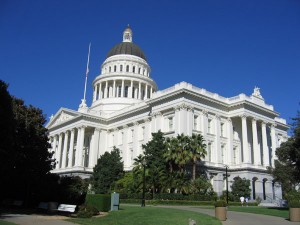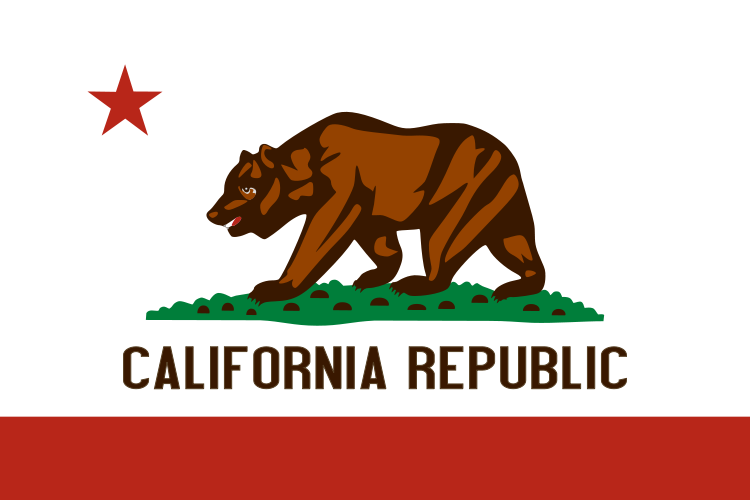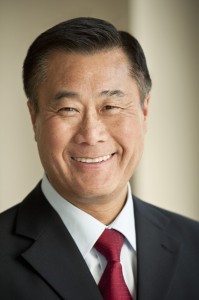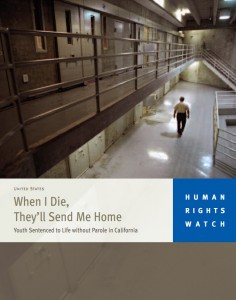 A new proposal in California may provide a second chance for the roughly 227 inmates serving the sentence of life without parole for crimes committed before their 18th birthday.
A new proposal in California may provide a second chance for the roughly 227 inmates serving the sentence of life without parole for crimes committed before their 18th birthday.
Under California’s Senate Bill 9, inmates sentenced to life without parole (LWOP) for crimes committed as a juvenile have the option to submit a petition for consideration of a new sentence after serving 15 years. If approved by the review court an LWOP sentence could be reduced to a stint of 25 years to life, a prison term that comes with the possibility of parole.
“The neuroscience is clear – brain maturation continues well through adolescence and thus impulse control, planning, and critical thinking skills are not yet fully developed,” state Sen. Leland Yee (D-San Francisco), a child psychologist and author of the bill, said through his office. “SB 9 reflects that science and provides the opportunity for compassion and rehabilitation that we should exercise with minors. SB 9 is not a get-out-of-jail-free card; it is an incredibly modest proposal that respects victims, international law, and the fact that children have a greater capacity for rehabilitation than adults.”
Patricia Soung, staff attorney at the National Center for Youth Law (NCYL) agreed, saying, “this is a modest bill. It holds people accountable, but it also recognizes that at ages 15, 16, 17, that they have a capacity to change.”
A coalition of youth advocate organizations, including the NCYLNational and Human Rights Watch, have supported the bill along with a diverse following of child advocates, faith-based communities, mental health experts and others.
“At the most basic level the sentence of LWOP for those convicted under 18 years old… is clearly in violation of international law,” said Elizabeth Calvin, Senior Advocate for Human Rights Watch and LWOP Coordinator. “I think we’re at a point in time where the community doesn’t think over-incarceration is the way to go.”
Outside the United States just seven people are known to be serving life without parole for crimes committed while they were still a juvenile, according to a Human Rights Watch report. By comparison the United States currently houses more than 2,300 such inmates with no chance of parole.
A group of criminal justice organizations in the state have raised opposition to the new measure. In a letter to lawmakers the California District Attorneys Association raised concerns about the specific sentence recall process:
“Under one scenario contemplated by the measure, a petitioner found by the court to have been under the age of 18 at the time of the offense that resulted in his or her LWOP sentence could qualify for a resentencing hearing solely on the basis that the petitioner has performed acts that tend to indicate rehabilitation, or the potential for rehabilitation, or has shown evidence of remorse. Creating the potential for an LWOP sentence to be reduced by setting such a low standard for eligibility is an affront to justice and disrespectful of the victims of these crimes.”
Ten other organizations, including the Crime Victims Action Alliance and the California Association of Highway Patrolmen, have opposed the bill along with “one private individual” according to Assembly Bill Analysis records.
Under the current law judges and prosecutors have the discretion to pursue LWOP cases against juveniles, but a number of such instances have called their judgment into question. Some experts also point out that the harshness of sentences can simply come down to local jurisdiction.
“In California, the decision to impose an LWOP sentence on a youth is significantly influenced by which county they reside in,” said Selena Teji, Communications Specialist with the Center for Juvenile and Criminal Justice. “A youth is more likely to receive harsher punishment if they live in Kern County, than if they had committed that same crime in San Francisco County. It’s a system of justice by geography.”
Other supporters of the legislation also say the measure could correct racial disparities that have become apparent in the last few decades.
"We're talking about children, especially children of color, who are sentenced to die in prison,” Sumayyah Waheed, director of the Books Not Bars program at the Ella Baker Center in Oakland. “It's bad policy, immoral, and it's way past time for California to allow youth one tiny step toward redemption. California can and must do better by its children."
California’s law permitting a life without parole sentence for juveniles was enacted in 1990. Since that time African Americans in the state have received the LWOP sentence at a rate of 18 times that of whites, earning the state the worst record in the nation for racial disparity in LWOP sentencing.
According to the Human Rights Watch report “When I Die, They’ll Send Me Home” life without parole isn’t reserved for those youth that committed the most heinous crimes. Forty-five percent of juveniles sentenced to LWOP in California were sentenced for involvement in a murder they didn’t actually commit. Many were convicted of murder charges for aiding and abetting a murder or getting involved in another felony crime, such as a robbery, when a murder took place. Nationally, roughly 59 percent of juveniles sentenced to LWOP had no prior offenses.
California’s SB 9 was approved by the Assembly Public Safety Committee with a 5-2 vote in early July. Next the bill will continue to the Assembly Appropriation Committee before being put to a vote on the floor of the Assembly. The bill cleared the Senate in June with a 21-16 vote.
“We’re pretty optimistic,” said Calvin. “The bill could still fail, but we’re hopeful.”
In 2009 a similar bill failed to clear the Assembly by two votes. SB 9 likely won’t come to a vote until late August or early September, following the Assembly’s summer recess.
| Supporting | Opposing |
|---|---|
| ___ | ___ |
| Human Rights Watch, Children's Rights Division (Sponsor) Advancement Project Alliance for a Better District 6 American Civil Liberties Union American Federation of State, County and Municipal Employees American Probation and Parole Association American Psychiatric Association Bar Association of San Francisco Books Not Bars (An Ella Baker Center for Human Rights Campaign) Buddhist Peace Fellowship California Attorneys for Criminal Justice California Catholic Conference, Inc. California Church Impact California Coalition for Women Prisoners California Committees United Institute California Mental Health Directors Association California National Organization for Women California Psychiatric Association California Public Defenders Association California-Nevada Annual Conference of the United Methodist Church Californians United for a Responsible Budget Campaign for the Fair Sentencing of Youth Center for Global Law & Justice at University of San Francisco School of Law Center for Juvenile Law and Policy at Loyola Law School Child Welfare League of America Children's Advocacy Institute Children's Defense Fund Commonweal Disability Rights California Disability Rights Legal Center District Attorney, City and County of San Francisco Equal Justice Initiative Everychild Foundation Feminist Majority & National Center for Women and Policing Friends Committee on Legislation of California Healing Justice Coalition Human Rights Advocates International Community Corrections Association John Burton Foundation for Children Without Homes Just Detention International Justice Now Justice Policy Institute Juvenile Law Center Law Offices of the Los Angeles County Alternate Public Defender Legal Services for Children Legal Services for Prisoners with Children Life Support Alliance Los Angeles County Democratic Party Lutheran Office of Public Policy - California NAACP Legal Defense and Education Fund, Inc. National African American Drug Policy Coalition, Inc. National Alliance on Mental Illness California National Center for Lesbian Rights National Center for Youth Law Office of Restorative Justice of the Archdiocese of Los Angeles Pacific Juvenile Defender Center Post-Conviction Law Justice Project at University of Southern California Gould School of Law Prison Fellowship Prison Law Office Progressive Christians Uniting Public Counsel Law Center Sacramento Lorenzo Patiflo League of United Latin American Citizens Council Sisters of St. Joseph of Orange Southern Poverty Law Center St. Mark Presbyterian Church, Peace and Justice Commission The Sentencing Project United Church of Christ W. Haywood Burns Institute Youth Justice Coalition Youth Law Center 1,879 private individuals |
California Association of Highway Patrolmen California District Attorneys Association California Narcotic Officers' Association California Police Chiefs Association California State Sheriffs Association Crime Victims Action Alliance Crime Victims United of California Los Angeles County District Attorney's Office Los Angeles Police Protective League Peace Officers Research Association of California Sacramento County District Attorney's Office One private individual |
Source: SB 9 Bill Analysis by the Assembly Committee on Public Safety. July 5, 2011.



Amen to this proposel, we see the crime that these teens made. But we dont look into them has children, and what they need to reabilatate, or why this action is taking place. We lock them up and throw away the key. Think about it, if this world was taking the time to care for our children, mold them into good men and women, are crimes would be lower. But we dont, we leave children in abusive homes, homes of drugs, weapons, some kids feeling the need to steal, just to eat, and kids acting in a hatered crimes, has murder. Why? Life may get to where you had to protect your self from someone who is abusing you. Whatever it might be, at that age kids act in a way they have been shown. Or in a quick response to protect themselves. I know there are many different situations out there! But when do we protect our children. Well LWOP is not the answer, these are our children, they need to be protected and a chance to live life!
my self i think you should look of older lwop inmates records an release then special with a good good in orison dont let then dye in there some of then need to stay in recovery for then selves but some are only cost the state alot of money thats me only
We are, once again, both shocked but not surprised that an article such as this would not have anywhere in it one single reference to the victims of these crimes, nor any mention of the fact that most of these teen killers proposed to be freed by SB 9 are guilty of some of the most heinous murders in California history. Reading the article one would almost think their crimes were victimless and non-violent. Also, the list of opponents to the bill is wrong, short, and we are among the several outraged groups that our opposition is not being listed by the California legislative website.
But to the bottom line: SB 9 is unconstitutional, unnecessary, costly, dangerous, and re-traumatizing.
Unconstitutional: SB 9 has been legally analyzed by three independent legal experts who all concur that it violates Marsy’s Law, passed in 2008, California’s constitutional protections for victims rights. If SB 9 were to pass, it would be challenged in court, costing the taxpayers more millions, and it would fall. Save yourselves the trouble – stop the bill now.
Second, it is unnecessary because the system already works to correct overly sentenced or wrongfully sentenced teens. Clemency, appeals, habeus challenges, and many other re-sentencing opportunities exist in the current system, and teen offenders are being re-sentenced all the time, WHERE THERE IS MERIT.
Third, a prominent defense attorney who defends criminals for a living has done a complete cost analysis of what the California taxpayer would pay for EACH of the allowed challenges to their sentence that SB 9 would give each convicted teen killer. It would be between $175,000 and $600,000 per case, per inmate, per challenge. This could mean millions of dollars in expenditures mandated for California taxpayers that would not result in any significant reduction in prison population or costs of incarceration. SB 9’s sponsor Sen. Yee has consistently refused to address this concern, as well as the constitutional issue.
SB 9 is also potentially very dangerous, given that half of all offenders released from prison recidivate, often soon, often violently. Then there are more victims, and the taxpayers once again have to pick up the tab for re-apprehending, re-trying, and re-incarcerating these offenders.
Finally, and worst for us, this legislation requires already devastated victims families to re-open wounds on a regular basis, perhaps for the rest of their lives, having to battle the offenders’ constant challenges for release. Never being able to get legal finality, SB 9 simply transfers the life sentence from the offender to the victims families left behind.
Advocates for SB 9 have consistently refused to stand for the human rights of the VICTIMS families of these cases. We asked them to help find and notify all affected families of this legislation to free teen killers. They have refused.
We asked them to use restorative justice processes to create a broad “all stakeholders included” public policy discussion about how to craft juvenile justice reform legislation that could help address some of their concerns, but that would not rely on agonizing victims families in the process and further destroying the California budget and public safety. They have refused.
We have asked them to stop publicizing propaganda and misinformation about the wrongly interpreted brain research, how America compares with other nations in sentencing violent offenders, and the true nature of the offenders and offenses. They have refused.
They have lost all credibility as human rights advocates in this effort.
SB 9 must be defeated, and a positive process for reform undertaken with all stakeholders at the table.
NOVJL
The National Organization of Victims of Juvenile Lifers
http://www.teenkillers.org
Dear organization,
Everybody deserves a second chance, this are children we are talking about, do you remember when you were a child, how many mistakes did you commit? And you learned from it, right? And not to mention a second chance for the children who were inocent and convicted guilty, yes innocent. It happens in our justuce system all the time, dont make me call out case numbers.
Sincerely,
Your Mr. Cambero